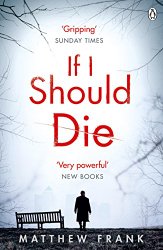If you ever get to Greenwich, here’s what you do: stroll up the hill, acquaint yourself with the meridian, have a cup of tea at the tea house, then stroll down, buy lunch at the food court – I recommend the sushi, though the Ethiopian stand is pretty good too – and eat it at the park next to the conservatoire; if the weather’s good, the windows will be open and you’ll be greeted by a cacophony of instruments and voices. Make your way past the Cutty Sark and get back to wherever you came from.
Why am I telling you this? Because it’s more interesting than the book I read, Matthew Frank’s debut novel If I Should Die.
Meet Joseph ‘Joe’ Stark (no relation, or semblance, to Tony), war hero-turned-policeman. He’s left the army after some shenanigans with ‘Terry Taliban’ and has now become a ‘copper’ in Greenwich. He of the unimaginative nicknames soon becomes embroiled in a series of happy slapping kind of get-togethers with the local hoodlums (who also receive a barrage of superlatives further showcasing his lack of imagination), a gang of Cockney clichés from the local housing estate. The gang has the misfortune of attacking a vagrant with army training who fights back, and one of the ringleaders is killed. A suspect is arrested but others keep keeling over anyway. And then there’s the mysterious witness, a girl with pink hair who Joe/Joseph, with a keen eye for irony and wit, has dubbed ‘Pinky’ and who may or may not have something to do with the entire affair.
I’m pretty sure there’s more to the plot but it’s all so mind-numbingly tedious that I blacked out for parts of it. There’s a whole subplot about Stark being injured and visiting a legion of therapists and doctors and being chased by an army person named Captain Pierson. His annoying psychologist, of course, turns out to be not nearly as stupid as Stark thinks, though we the audience remain wholly unconvinced, and his aquatic therapist is, of course, a total babe who, judging from the descriptions, really can’t dress herself and has the personality of an eggplant. Stark also appears to be bipolar, speaking solely in army (‘Sir’) and Cockney (‘Guv’) staccato the one moment, clamming up at the merest hint of personal interest, then firing of predictable and unfunny one-liners at his boss the next. Thankfully, he’s surrounded with characters whose two-dimensionality leaves little room for brains, and they don’t appear to notice. They applaud him for finding the predictable plot twists that come barging into the book with all the subtlety of a rhinoceros in a tutu, and for not taking time off and coming on the job drunk and high on pills.
Put it this way: he’s got a personality disorder, suffers from PTSD, drinks too much, is probably addicted to prescription drugs, and he still functions better than they do, basically solving the crimes as his superiors toodle along, occasionally patting him on the head whilst scratching their own.
There are weird frills (a colleague with an abusive spouse; a cameo appearance by the Queen; Stark, for some reason, trying to set up his boss with a pathologist) that never go anywhere. The dialogue seems to be drawn together from the Big Book Of Cop Show Clichés (“So we stand by Stark. Now get that arrogant, insolent, ungrateful gobshite home and put him to bed.”) The villains are uninteresting and devoid of either menace or charm; they’re just kind of there, wearing sneakers and tracksuits and toying with mobile phones. In fact, the whole book is oddly devoid of physical character descriptions; we learn Stark is lean and skinny, his boss is rotund and has something Carribean in her, and basically, that’s it.
The author blurb at the beginning announces this is the first book in a series about mr. Stark. Needless to say, I won’t be along for the ride. It’s not the worst book ever (I’m eying you, EL James and Dan Brown) but it’s bland and sophorific.
But by all means, do visit Greenwich. The food’s brilliant.

